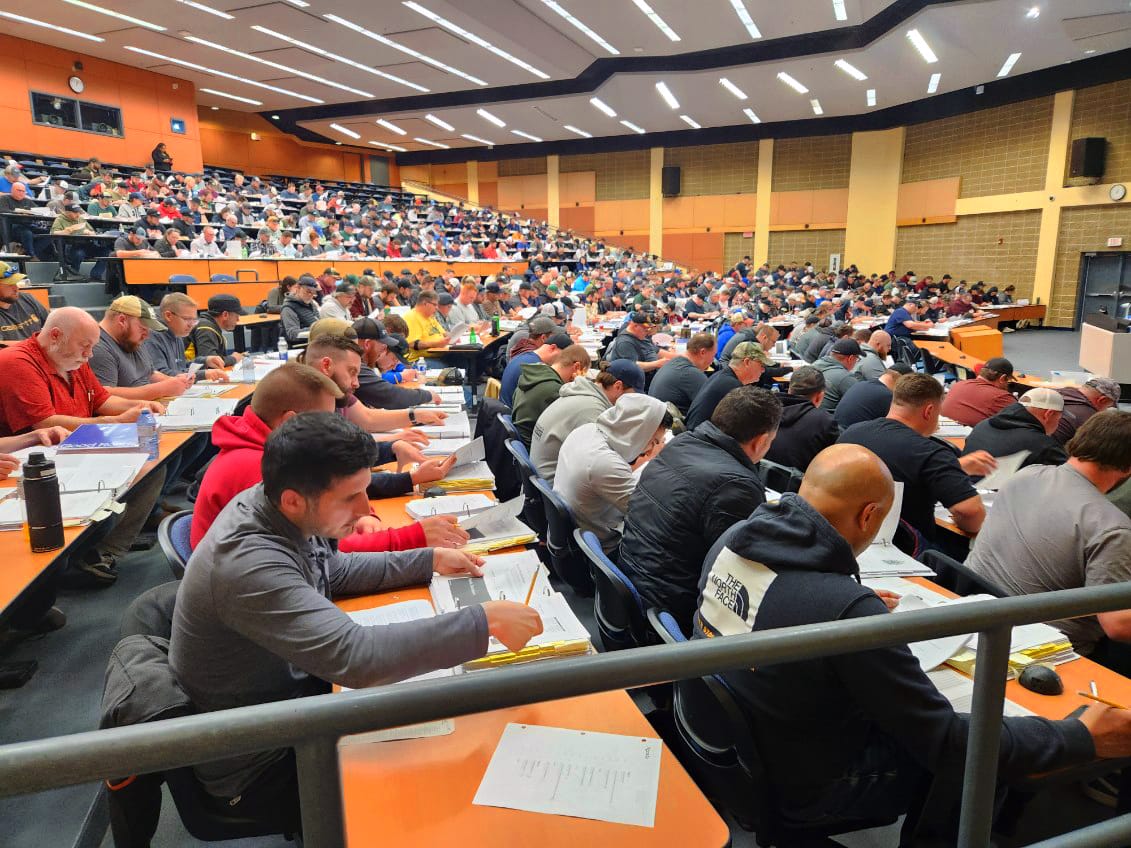
You will review a proposed or existing system to provide an overall understanding of sanitary sewer design. You will then complete a sanitary sewer design by using first principle methods and/or design aids (nomographs, tables, etc.).
Course Content
- Overview of sanitary sewers
- Sanitary sewer loadings
- Sewer inspection and rehabilitation
- Hydraulics
- Design parameters
- Structural design of flexible and rigid pipes
- Forcemains
Who Should Attend
Engineers in training, designers, technicians and technologists who are employed in the sewer design field and have a basic understanding of sewer design.
Prerequisites
Basic understanding of Sewer Design.
Evaluation Process
Passing Grade: 60%. Practical design case studies, and comprehensive final examination
Accreditation
This course is recognized by:
- This course qualifies as a “specialized course” for the Association of Ontario Road Supervisors (AORS) Certified Road Supervisors – Intermediate level (CRS-I) certification program.
- OACETT= This course may be used for technical specialist, technician, and technologist programs. Point Value = 6
- The Engineering Institute of Canada awards 3 Continuing Education Units to this course.
- This course meets the Ministry of the Environment’s criteria for Continuing Education training for wastewater operators under O.Reg. 129/04 and has been assigned 3.1 Continuing Education Units.

Prepares you to design new watermain systems and to design additions or replacements for existing systems.
Course Content
- Sources of water supply
- Estimating water demand/conservation
- Hydraulics
- Network modelling
- Structural design details/appurtenances
- Watermain appurtenances
- Design considerations and other utilities
- Watermain rehabilitation
- Soil corrosion and cathodic protection
- Environmental considerations and approvals
- Budget and cost analysis
- Tendering and special provisions
- Field trip
Who Should Attend
Engineers, technicians and technologists who are employed in the watermain design field and have a basic understanding of watermain design principles.
Prerequisites
Knowledge of basic hydraulics.
Evaluation Process
Passing Grade: 60%. Case study and comprehensive final examination.
Accreditation
This course is recognized by:
- This course qualifies as a “specialized course” for the Association of Ontario Road Supervisors (AORS) Certified Road Supervisors – Intermediate level (CRS-I) certification program.
- This course may be used for technical specialist, technician, and technologist programs. Point Value = 7
- The Engineering Institute of Canada awards 3.5 Continuing Education Units to this course.
- This course meets the Ministry of the Environment’s criteria for Director Approved Continuing Education training under O.Reg. 128/04 and has been assigned 3.5 Continuing Education Units.

Ideas. Inspirations. Contacts. Every year, the Good Roads Annual Conference brings together members and affiliated enterprises for an intensive three-day summit of road-forward thinking. The speaker roster is always first-class. The exhibit hall is loaded with innovations. The learning is cutting-edge. Meet your peers. Take home new energy and important ideas for the coming year.

Using the concepts, procedures, and methods identified in the Ontario Structure Inspection Manual (OSIM) you will:
• Identify the type and severity of material defects,
• Assess and rate the condition of a variety of bridge elements, and
• Report your findings using the OSIM forms.
Course Content
• Types of Bridges
• Bridge Elements
• Materials focusing on concrete, steel, and asphalt.
• Material defects
• Procedures for conducting and documenting a detailed visual inspection using OSIM, including identification of material defects, material condition, defect severity levels, and performance deficiencies.
• Inspection Safety
• Field trips to bridges
Who Should Attend
Government employees, consultants, and contractors involved in the detailed visual inspections of bridges, or individuals who need to gain an understanding of OSIM reports.
Recommendations
A basic understanding of bridge types and bridge elements.
Materials Required
• CSA approved safety vest, hard hat, safety boots, safety glasses, and appropriate outdoor clothing for the field trips.
o Clothing: CSA Standard Z96-15
o Hard Hats: CSA Standard Z94.1-15
o Work Boots: CSA Standard Z195-14
o Safety Glasses: Z94.3.1-16
• Calculator
Evaluation Process
Pre-course evaluation, case studies, field assignments, and open-book knowledge evaluation.
Accreditation:
This course is recognized by:
- This course is recognized by:This course qualifies as a “specialized course” for the Association of Ontario Road Supervisors (AORS) Certified Road Supervisors – Intermediate level (CRS-I) certification program.
- This course may be used for technical specialist, technician, and technologist programs. Point Value = 7
- The Engineering Institute of Canada awards 3 Continuing Education Units to this course.

Comprehensive overview of the concepts of stormwater management and stormwater management system design.
Course Content
- Why we do stormwater management
- Stormwater management alternatives
- Stormwater management design principles and phases of completion
- Retrofits of stormwater facilities
- What to do when things go wrong
- Municipal Class EA process
- Stormwater pond maintenance
- Monitoring stormwater ponds
- Low Impact Development Modelling
- Field trip
Who Should Attend
Engineers, technicians, technologists, and others responsible for design, inspection, and maintenance of stormwater management facilities.
Prerequisites
Storm Sewer Design (TM31) or previous knowledge of hydrology would be helpful.
Evaluation
Passing Grade: 60%. Comprehensive final exam
Accreditation
This course is recognized by:
- This course may be used for technical specialist, technician, and technologist programs. Point Value = 7
- The Engineering Institute of Canada awards 3 Continuing Education Units to this course.
- This course meets the Ministry of the Environment’s criteria for Continuing Education training for wastewater operators under O.Reg. 129/04 and has been assigned 3.5 Continuing Education Units.

NEW in 2025: Course fees now include a complimentary meal plan (breakfast, lunch, & breaks).
The Maintenance section provides participants with a basic foundation prior to attending any of the C.S. Anderson Road School courses. The T.J. Mahony Road School is a two-part course comprised of a construction and a maintenance section. Road construction and road maintenance are offered in alternate years.
Course Content
- Minimum Maintenance Standards
- Road maintenance and drainage legislation
- Drainage structures maintenance
- Road surface maintenance
- Road markings
- Legal demo
- Roadside maintenance
- Signs, signals and devices
- Winter maintenance
- Legal issues
Who Should Attend
Public works employees involved in road construction and/or maintenance.
Certificate
A grade of 65% is required on each of the two Mahony sections to successfully complete the course.
Accreditation
This course is recognized by:
- The T.J. Mahony completion certificate is one of the options for the AORS Certified Road Supervisors Certification program, contact AORS for additional details.
Must take both construction and maintenance to obtain 10 points credit in the technical specialist exam program.
- These courses may be used for the technical specialist program if you complete the construction course and the maintenance course. Point Value: 10
- The Engineering Institute of Canada awards 2 Continuing Education Units to this course.

By working through several examples, you will learn how to create crisp, concise and clear reports. You learn how to present reports persuasively, using common audio-visual aids.
Course Content
• What makes a good report
• How to write clearly and concisely
• How to organize your thoughts and materials
• How to give your report more punch
• How to deliver your presentation like a pro
• Getting comfortable with the use of audio-visual aids
• Tips for overcoming nervousness
Who Should Attend
CRS candidates and anyone who is asked to prepare and deliver brief reports to senior management and Council.
Format
Presentations, discussions and group assignments
Evaluation Process
Prepare and deliver a short report and presentation to a mock council plus a comprehensive final examination.
Accreditation
This course is recognized by:
- This course is a mandatory requirement for the Association of Ontario Road Supervisors (AORS) Certified Road Supervisors- Senior level (CRS-S) certification program.
- This course may be used for the technical specialist program only. Point Value = 5
- The Engineering Institute of Canada awards 2 Continuing Education Units to this course.

NEW in 2025: Course fees now include a complimentary meal plan (breakfast, lunch, & breaks).
Bridge and Culvert Management deals with the principles of good management of bridges and culverts, and outlines the need for routine inspections, preventative maintenance, and proper signage of structures.
Course Content
- Types of bridges
- Terminology and structure components
- Bridge and culvert inspection
- General housekeeping
- Concrete bridge and culvert maintenance
- Concrete deck rehabilitation
- Steel bridge and metal culvert maintenance
- Load limit posting and vertical clearance
- Deck joints and bearings
- Timber bridges
- Soil steel culvert installation and construction
- Precast concrete culvert installation and construction
- Field trip inspections of various structures
- Ontario Structure Inspection Manual (OSIM)
Who Should Attend
Supervisors, general forepersons and other personnel involved in resolving problems associated with existing municipal bridges and culverts.
Accreditation
This course is recognized by:
- This course qualifies as a “specialized course” for the Association of Ontario Road Supervisors (AORS) Certified Road Supervisors- Intermediate level (CRS-I) certification program
- This course may be used for the technical specialist program only. Point Value = 5
- The Engineering Institute of Canada awards 2 Continuing Education Units to this course

NEW in 2025: Course fees now include a complimentary meal plan (breakfast, lunch, & breaks).
Course Content
• Management vs. leadership
• Communications
• Conflict management
• Work & personal life balance
• Organizational structure & culture
• Team building
• Performance management
• Emotional intelligence
Who Should Attend
Municipal supervisors and managers, and future supervisors.
Accreditation
This course is recognized by:
- This course or Managing Human Resources is a mandatory requirement for the Association of Ontario Road Supervisors (AORS) Certified Road Supervisors – Intermediate level (CRS-I) certification program.
- This course may be used for the technical specialist program only. Point Value = 5
- The Engineering Institute of Canada awards 2 Continuing Education Units to this course.

NEW in 2025: Course fees now include a complimentary meal plan (breakfast, lunch, & breaks).
Fleet Management offers an overview of best practices related to municipal fleet management, procurement, equipment maintenance programs, and regulatory compliance.
Course Content
• Equipment procurement
• Greening the fleet
• Fuel management
• Work order management
• Purchase orders
• Inventory controls
• Seasonal changeovers
• Vehicle assessments
• Preventative maintenance
• Shop health and safety
• Facility management
• Facility security and emergency plans
• Record-keeping
• Training
• Licenses
• Collision investigations
• CVOR requirements
Who Should Attend
Road/fleet supervisory staff.
Accreditation
This course is recognized by:
- This course qualifies as a “specialized course” for the Association of Ontario Road Supervisors (AORS) Certified Road Supervisors – Intermediate level (CRS-I) certification program.
- This course may be used for the technical specialist program only. Point Value = 5
- The Engineering Institute of Canada awards 2 Continuing Education Units to this course.
















